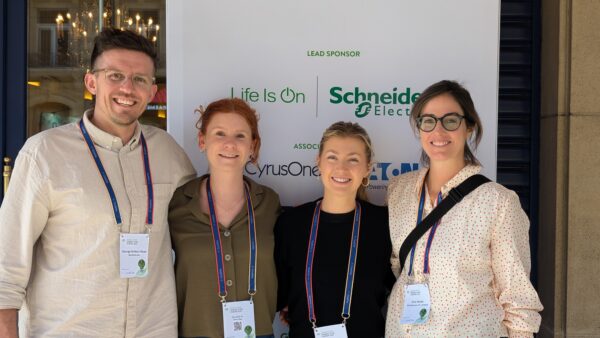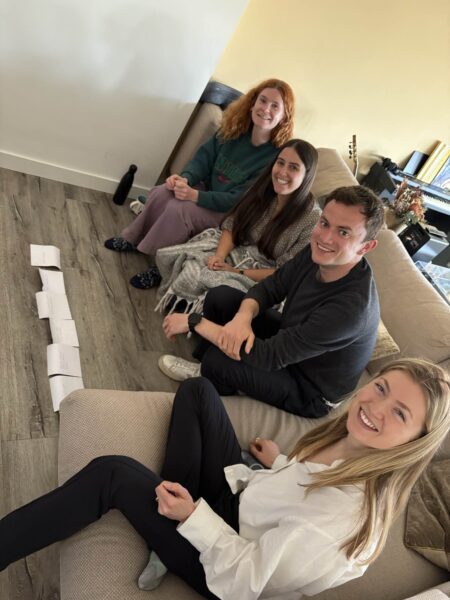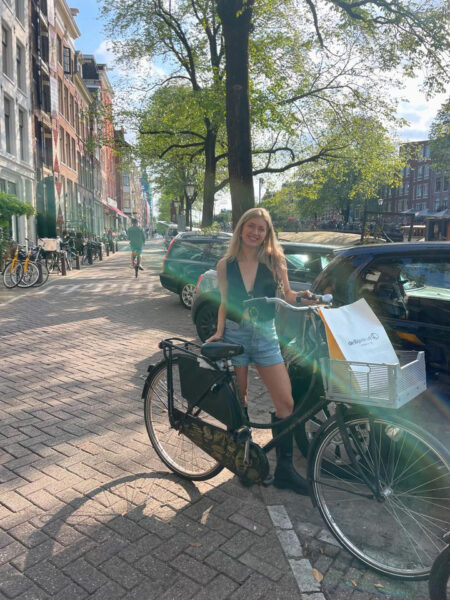From California to Amsterdam, Lindsay McConville’s journey has been shaped by curiosity, resilience, and a drive to make digital infrastructure more sustainable. Lindsay has spent the past four years growing her career at Northshore. She started as an intern and is now the Program Manager of Energy and Sustainability. Along the way, she’s held roles as a Senior Consulting Engineer and Energy Project Engineer, gaining hands-on experience and expertise in delivering energy strategies and sustainability solutions for complex data center operations.
Lindsay brings a thoughtful and strategic lens to the fast-evolving data center space. She’s passionate about helping clients not only meet regulatory requirements but also define meaningful program goals, track their progress, and deliver measurable results.
We sat down with Lindsay to talk about her path in the industry, her move to Amsterdam, and how she’s helping shape the future of sustainable digital infrastructure.
Q: What initially drew you to this industry, and what was the journey getting to where you are today?
 “I actually knew nothing about the data center industry when I first came across it. It all started with an internship posting from Northshore that was shared through a college engineering board. What really caught my attention was a stat I stumbled on while researching: data centers consume 1–1.5% of global electricity. That stat sparked my curiosity, and after doing some digging, I realized just how massive and fast-growing this sector really is and how much potential it holds for impact, especially from an energy perspective. After talking with Matt, Northshore’s CEO, and going through interviews, I joined as an intern and learned how the industry works, the challenges it faces, and what Northshore was doing to solve them. I ended up thoroughly enjoying the work. I found it dynamic, technical, and anything but static. That combination of impact and innovation is what kept me in the industry. Ultimately, that’s what inspired me to grow with Northshore and continue developing my role within the company.”
“I actually knew nothing about the data center industry when I first came across it. It all started with an internship posting from Northshore that was shared through a college engineering board. What really caught my attention was a stat I stumbled on while researching: data centers consume 1–1.5% of global electricity. That stat sparked my curiosity, and after doing some digging, I realized just how massive and fast-growing this sector really is and how much potential it holds for impact, especially from an energy perspective. After talking with Matt, Northshore’s CEO, and going through interviews, I joined as an intern and learned how the industry works, the challenges it faces, and what Northshore was doing to solve them. I ended up thoroughly enjoying the work. I found it dynamic, technical, and anything but static. That combination of impact and innovation is what kept me in the industry. Ultimately, that’s what inspired me to grow with Northshore and continue developing my role within the company.”
Q: What are some success stories have you had in your consulting experience?
 “One of my most rewarding experiences in consulting has been working with the same client throughout my time at Northshore on long-term, programmatic energy projects. These programs have grown in scope and impact year after year, allowing me to build strong relationships with key stakeholders, an essential part of driving real results in consulting. Being able to grow alongside the client while watching their programs mature has been incredibly meaningful.
“One of my most rewarding experiences in consulting has been working with the same client throughout my time at Northshore on long-term, programmatic energy projects. These programs have grown in scope and impact year after year, allowing me to build strong relationships with key stakeholders, an essential part of driving real results in consulting. Being able to grow alongside the client while watching their programs mature has been incredibly meaningful.
A standout moment was supporting one of our largest clients in their first year of reporting under the EU Energy Efficiency Directive (EED). With over 10 countries involved and no process in place, I helped design and implement a full reporting framework by translating regulatory requirements into clear KPIs and building structured workflows for collecting, validating, and submitting energy data across the client’s European portfolio. Despite it being a brand new requirement, all countries met the deadline and submitted high quality, comprehensive data, outperforming many peers in the industry. It was a great example of collaboration, adaptability, and impact at scale.”
Q: What do you enjoy most about being part of Northshore?
“The scale of impact in the data center and digital infrastructure industry is massive. Even small energy savings translate into meaningful, global results. The work feels strategic and purpose driven, which makes it incredibly rewarding. I also really value the long-term relationships I’ve built with clients and with the Northshore team. Those bonds have shaped our work and made it possible to deliver programs that truly make an impact.”
Q: You made the move a few years ago from California to Amsterdam, a city globally recognized for its smart city leadership and low-carbon initiatives. What stands out to you about how Amsterdam approaches sustainability differently than the United States?
 “Amsterdam’s approach to sustainability is how deeply it’s embedded into daily life. As a cyclist, you’re practically royalty. The city is designed around biking, with infrastructure that makes it safe and accessible for everyone, rain or shine.
“Amsterdam’s approach to sustainability is how deeply it’s embedded into daily life. As a cyclist, you’re practically royalty. The city is designed around biking, with infrastructure that makes it safe and accessible for everyone, rain or shine.
Beyond mobility, the Dutch take a uniquely proactive approach to climate resilience, especially with water management, leveraging systems like polders and building homes on stilts to adapt to being below sea level. They also prioritize innovative solutions like district heating and cooling networks, which are still rare in the U.S. Altogether, Amsterdam embraces a mindset of practicality, long-term thinking, and community access in a way that feels very different from most American cities. I love that ideology.”
Q: How can data centers be better stewards to local communities and to the environment, so we don’t run into issues?
“There’s a significant disconnect between data centers and the communities they operate in, largely due to a lack of communication and meaningful engagement. Many data center companies focus only on minimizing negative impacts, like noise or diesel emissions rather than proactively contributing to the community. Opportunities like district heating, cooling networks, or biodiversity projects could build more positive relationships, but are often overlooked. Because of this, the industry faces public pushback and misunderstanding, which could be reduced through more intentional, community-centered efforts.”
Q: What advice would you give to someone looking to join the data center industry?
“First, embrace documentation and standards. Like many other industries, there are countless frameworks, regulations, and best practices you’ll want to familiarize yourself with depending on your role. For example, on the Sustainability Team in Europe, I had to become very knowledgeable about ISO standards, EU regulations, and voluntary reporting requirements like the CNDC Program. If you’re working in an engineering or operations role, resources like ASHRAE TC 9.9 will be especially relevant. For those in Sales, the Uptime Institute Tier Standards can make a big difference.
Second, remember that this industry is developing quickly. New challenges and solutions emerge constantly, so staying curious and keeping up with trends is critical. The combination of technical rigor and adaptability is what will allow you to grow your expertise and ultimately make an impact.”
